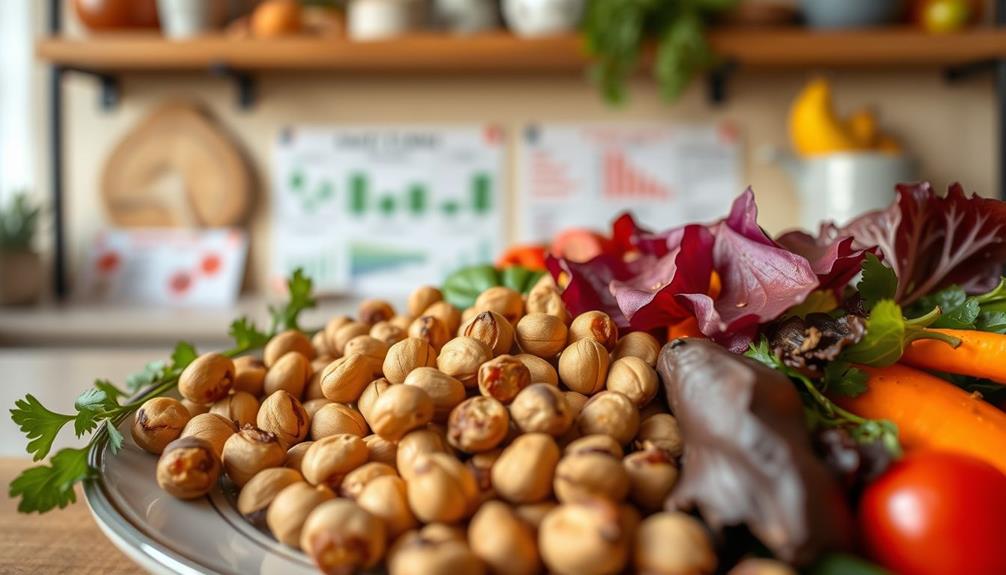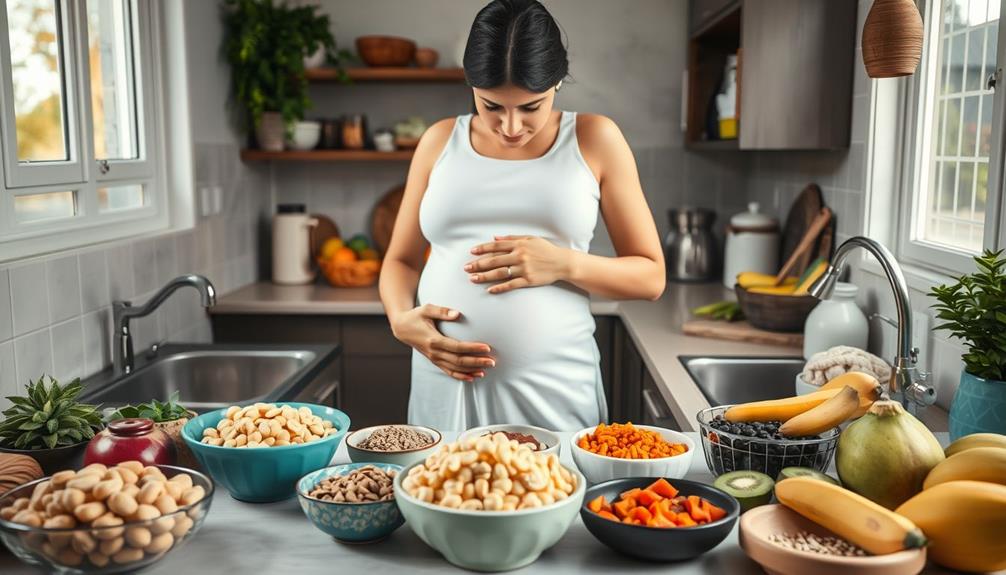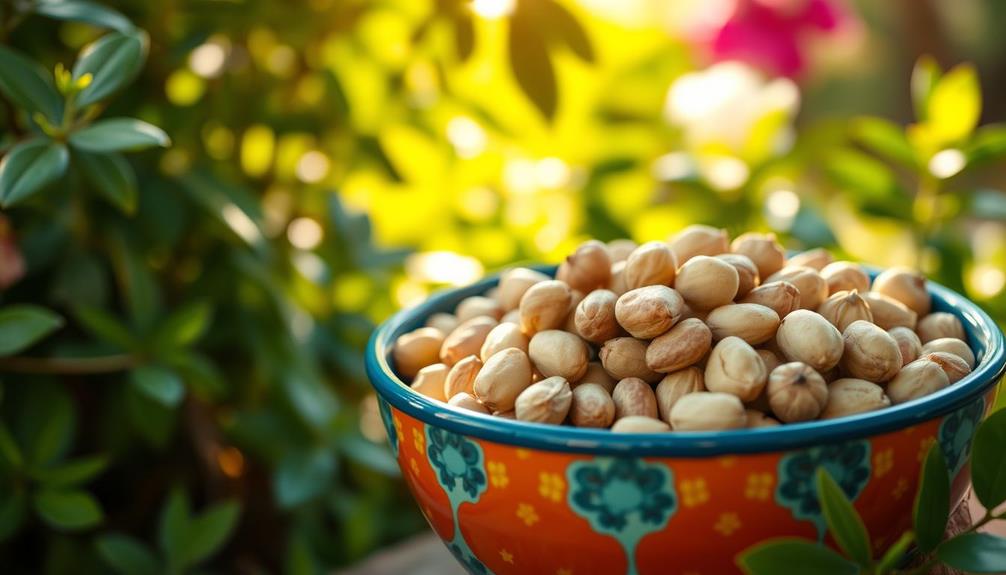Pregnancy food cravings can feel mysterious, but they're often tied to hormonal shifts and nutritional needs. When you crave groundnuts, your body might be signaling a need for protein, healthy fats, or essential minerals like iron and zinc. Emotional factors, like nostalgia or stress, also play a part, making comfort foods more appealing. Additionally, cultural influences can shape what you desire during this time. By understanding these psychological triggers, you can better manage cravings and fulfill your body's needs. Curious about how these cravings impact your experience? There's a lot more to explore about this fascinating topic.
Key Takeaways
- Groundnuts are often craved during pregnancy due to their high protein and healthy fat content, which support fetal development and maternal health.
- Cultural beliefs may link groundnut cravings to the baby's gender or health, enhancing their psychological significance for expectant mothers.
- Emotional states and nostalgia can trigger cravings for comfort foods like groundnuts, providing a sense of connection and emotional well-being.
- Nutritional deficiencies, particularly in protein and essential minerals, may manifest as cravings for groundnuts, indicating the body's need for specific nutrients.
- Satisfying cravings for groundnuts can improve mood and reduce guilt, contributing positively to the overall pregnancy experience and self-care.
Understanding Food Cravings
Food cravings during pregnancy are a common experience for many women, affecting around 50-90% of expectant mothers. You might find yourself suddenly desiring specific foods like sweets, salty snacks, or comfort foods that you didn't crave before.
These cravings can arise from various psychological factors, such as mood swings and environmental cues that influence your choices. Additionally, adopting a holistic lifestyle approach during pregnancy can help manage these cravings effectively.
Hormonal changes during pregnancy heighten your sensitivity to taste and smell, making certain foods more appealing than they were pre-pregnancy. This means that foods you previously overlooked might now seem irresistible.
Nutritional theories also suggest that these cravings may signal underlying nutrient needs. For instance, if you're craving groundnuts, your body might be indicating a demand for protein, healthy fats, or essential vitamins.
Understanding your food cravings can provide valuable insights into your dietary patterns and preferences as a pregnant woman. By documenting what you crave, you can better grasp the interplay between your physiological needs and the psychological factors influencing your food choices.
Embracing this knowledge may help you navigate your pregnancy more comfortably.
Hormonal Influences on Cravings

How do hormonal changes shape your food cravings during pregnancy? During this time, significant increases in estrogen and progesterone heighten your food cravings, especially in the second trimester. These hormonal changes alter your taste receptor sensitivity, making you more susceptible to specific cravings.
You might find yourself yearning for foods rich in sugar, fat, and carbohydrates, including groundnuts, which are packed with protein and healthy fats. This craving for nutrient-dense foods can be beneficial, as it aligns with the body's needs for energy and sustenance during pregnancy. Additionally, incorporating raw food options can enhance nutrient absorption through uncooked ingredients.
As your body adjusts to increased fluid volume, you may also crave salty foods. This craving can be attributed to hormonal effects on sodium retention, influencing your desire for snacks that satisfy that need.
The psychological factors at play can't be overlooked either; these cravings often stem from emotional associations and memories tied to comfort foods like groundnuts. The second trimester is particularly pivotal, as cravings peak during this period due to intense hormonal fluctuations, making it a time when your body actively seeks out these comforting and satisfying foods.
While cravings may diminish in the third trimester, understanding their roots in hormonal changes and psychological factors can help you navigate this unique experience.
Nutritional Deficiencies and Cravings

Many pregnant women notice their cravings shifting towards specific foods like groundnuts, which can signal underlying nutritional deficiencies. These cravings may indicate a need for essential nutrients that are crucial for both you and your growing baby. Groundnuts are particularly appealing due to their rich nutrient profile, including protein, healthy fats, iron, and zinc.
When your body craves groundnuts, it might be responding to increased caloric needs during pregnancy. The high-energy content of these legumes helps support fetal growth and development. Nutritional deficiencies, especially in iron and zinc, can manifest as a strong desire for these nuts.
Here's a quick table summarizing the relationship between nutritional deficiencies and cravings for groundnuts:
| Nutrient | Role in Pregnancy | Craving Indicator |
|---|---|---|
| Iron | Supports blood production | Anemia or fatigue |
| Zinc | Aids immune function | Weakened immunity |
| Protein | Essential for growth | Increased energy needs |
| Healthy Fats | Supports brain development | Need for energy |
| Folate | Prevents neural tube defects | General nutrient need |
Understanding these cravings can help you make informed dietary choices during your pregnancy.
Psychological Triggers Behind Cravings

During pregnancy, your emotional connections to food can create strong cravings for familiar comforts like groundnuts.
This phenomenon is often influenced by various factors, including the need for certain nutrients and hormonal changes. Social interactions play a key role too; when you hear friends talking about their favorite snacks, it can spark your own desire for those flavors.
Understanding these psychological triggers can help you navigate your cravings more effectively, especially as you explore family activities that promote creativity.
Emotional Connections to Food
Pregnancy often brings a surge of emotional connections to food, tapping into nostalgia and personal memories. You might find yourself craving comfort foods like groundnuts, which may remind you of family gatherings or cherished cultural traditions.
These emotional connections to food are deeply rooted in your experiences and can provide a sense of security during a time of significant change.
Psychological factors play a critical role in these cravings. Mood swings and heightened stress levels can push you towards familiar foods that offer satisfaction and emotional relief. Groundnuts, often seen as a nutritious snack, not only appease cravings but also connect you to your heritage and familial roots.
Cultural beliefs further amplify the significance of these foods, making them integral to your pregnancy experience. As hormonal fluctuations amplify your emotional responses, you may find yourself indulging more in these nostalgic treats.
It's not just about hunger; it's about the comfort and memories they evoke. By understanding these emotional connections to food, you can navigate your cravings with a deeper appreciation for the psychological triggers at play.
Social Influences on Cravings
Social interactions can greatly influence your food cravings during pregnancy. When you hear friends or family discussing their cravings, it can spark similar desires in you. This phenomenon highlights the role of social interactions in shaping your cravings during pregnancy.
Environmental cues, like seeing tempting food advertisements, can also trigger those urges, emphasizing how context plays a part in your dietary choices.
Psychological factors, such as mood swings and stress, often lead to cravings as a way to seek emotional comfort. You might find yourself reaching for certain comfort foods simply because they provide a sense of relief during those trying moments.
Additionally, cultural influences play a significant role; your cravings may reflect traditional diets or local customs that resonate with your upbringing.
Keeping a cravings journal can be a helpful tool. By documenting your cravings alongside your social interactions and emotional states, you can gain insight into the psychological triggers behind your desires.
Understanding these connections can empower you to manage cravings more effectively while steering through the unique journey of pregnancy.
Common Cravings During Pregnancy

During pregnancy, you might find yourself craving a mix of sweet and salty foods, which can reflect both your nutritional needs and personal preferences.
This is a time when your body is undergoing significant changes, and cravings may also be influenced by hormonal shifts and emotional factors.
Cultural influences also play a role, shaping what you desire at different stages.
As these cravings fluctuate, it's important to assess your body's signals and respond to them wisely, especially considering the importance of a balanced diet rich in proteins and healthy fats to support overall health.
Sweet and Salty Cravings
Cravings can take on a life of their own when you're expecting, often manifesting as a mix of sweet and salty delights. During pregnancy, around 85% of women report experiencing food cravings, with nearly half craving sweets.
These sweet and salty foods can signal your body's needs; for example, a desire for chocolate might indicate a need for magnesium, while salty cravings could suggest dehydration or an electrolyte imbalance.
You may find that your cravings peak during the second trimester, when comfort foods often become your go-to snacks. It's a time when the combination of increased energy demands and hormonal changes heightens your need for sugary and salty treats.
You might also notice food aversions to items you once loved, which can further complicate your cravings.
Cultural influences play a significant role too, as traditional foods that provide a sense of nostalgia and comfort often become more appealing.
Embracing these sweet and salty cravings is a natural part of your pregnancy journey, reflecting both your physical needs and emotional ties to food.
Cultural Influences on Cravings
Food cravings often reflect not just personal preferences but also cultural influences that shape what you find yourself longing for during pregnancy.
You might notice that cravings for specific foods, like groundnuts, are common in many cultures. These cravings can be traced back to traditional diets where groundnuts were valued for their energy-dense properties and nutritional benefits, making them a popular snack among pregnant women.
Cultural norms often dictate what's considered desirable during pregnancy, so if you're surrounded by friends or family who enjoy groundnuts, you may find yourself craving them too.
In some societies, a desire for groundnuts carries special meanings, possibly linked to beliefs about the baby's gender or health. Such interpretations can heighten your cravings as you navigate this unique time.
Your cravings can also be influenced by social interactions, as shared experiences and discussions about food play a significant role in shaping your desires.
Understanding these cultural influences helps you appreciate why you might suddenly desire a handful of groundnuts or another culturally significant snack during your pregnancy.
Embracing these cravings can connect you to your heritage while nourishing your body.
Nutritional Needs Assessment
What drives those intense cravings you experience during pregnancy? As your body navigates this transformative time, it's responding to increased energy demands and nutritional needs. Understanding these cravings can help guarantee you maintain a healthy pregnancy.
Here are some common cravings and their possible nutritional implications:
- Sweets (49%): Often a sign of energy needs; your body may crave quick sources of calories.
- Salty Snacks (42%): Could indicate a desire for electrolytes, especially if you're sweating more or experiencing swelling.
- Spicy Foods (38%): Sometimes linked to hormonal changes; your body might be seeking flavor variety.
- Groundnuts: These protein-rich nuts may signal a need for healthy fats and protein, particularly if you're facing nutritional deficiencies.
Many women also crave fruits and dairy, reflecting potential deficiencies in vitamin C and calcium.
Monitoring these food cravings helps you manage your intake and meet your body's needs. By recognizing the nutritional implications behind your cravings, you can make informed choices that support both you and your baby during this significant time.
Health Implications of Cravings

During pregnancy, the phenomenon of food cravings can serve as a window into your nutritional needs. For instance, cravings for groundnuts may indicate a need for protein and healthy fats, vital for both fetal development and your health. However, it's important to recognize the health implications of these cravings. Excessive indulgence in unhealthy cravings can lead to complications such as gestational diabetes and hypertension.
Understanding your cravings can help you identify potential nutritional deficiencies. For example, a desire for groundnuts might suggest a need for zinc or magnesium. Here's a simple overview of common cravings and their associated health implications:
| Craving Type | Possible Nutritional Deficiency | Health Implications |
|---|---|---|
| Groundnuts | Zinc, Magnesium | Supports immune function, energy |
| Sweets | Chromium | May lead to excessive weight gain |
| Salty Foods | Sodium | Risk of hypertension |
| Dairy Products | Calcium | Important for fetal bone development |
Consulting with healthcare providers about unusual cravings or overindulgence is recommended to guarantee proper nutrient intake and address any potential health concerns.
Managing Cravings Effectively

Managing cravings effectively is essential for maintaining a balanced diet throughout your pregnancy. By implementing a few strategies, you can't only satisfy your cravings but also guarantee you're meeting your nutritional needs. Engaging in mindfulness practices, such as somatic therapy, can also help you become more aware of your body's signals and cravings, leading to healthier choices (body awareness techniques).
- Keep Healthy Snacks Handy: Stock up on yogurt, fruit, and whole grains. These options can help manage cravings while providing balanced nutrition.
- Practice Moderation: It's okay to indulge occasionally, but try to limit high-calorie or unhealthy foods to avoid potential gestational complications.
- Stay Hydrated: Drinking plenty of water can help reduce the intensity of cravings, especially for salty or sweet foods. Aim for regular hydration throughout the day.
- Mindful Eating: Pay attention to your hunger cues and savor each bite. This practice can prevent overeating and encourage healthier choices.
Don't hesitate to seek support from healthcare providers or registered dietitians. They can offer personalized guidance for managing cravings and guaranteeing you're getting adequate nutrient intake during this important time.
Cultural Perspectives on Cravings

Cultural perspectives on cravings reveal that these desires are often deeply rooted in regional customs and traditions. You might notice that your cravings during pregnancy are greatly influenced by the cultural practices surrounding you.
In some African cultures, for instance, groundnuts are a common craving because they're believed to provide essential nutrients and energy, much like how ancient Hopi villages reflect unique community layouts that emphasize nourishment and sustainability. These traditional foods not only satisfy cravings but also offer psychological comfort, often tied to childhood memories or family gatherings.
Cultural influences can also shape the myths surrounding cravings. You may have heard that specific foods can predict your baby's gender, which can further impact your dietary choices. This belief adds a layer of significance to what you crave, making it more than just a hunger issue.
Additionally, groundnuts are often viewed as symbols of fertility and nourishment. This perception reinforces their desirability during pregnancy, as you may be subconsciously seeking foods that maximize health benefits for both you and your baby.
Embracing the cultural context of your cravings can help you understand their origins and significance, ultimately enriching your pregnancy experience.
Frequently Asked Questions
Why Are Groundnuts Good for Pregnancy?
Groundnuts are great for pregnancy because they're packed with protein, healthy fats, and essential nutrients. They provide the amino acids your body needs for fetal growth and support brain development with their healthy fats.
Plus, groundnuts are a good source of folate, which helps prevent neural tube defects. With their antioxidants and fiber, they also help protect both you and your baby while easing common pregnancy discomforts like constipation.
Enjoy them as a nutritious snack!
What Is the Biological Reason for Pregnancy Cravings?
They say you're what you eat, and during pregnancy, your body craves specific foods for a reason.
Your hormones fluctuate considerably, increasing appetite and altering taste preferences. This biological shift signals your body's need for extra nutrients to support your growing baby.
Cravings often point to deficiencies, like iron or calcium, ensuring you get essential nourishment. It's your body's way of guiding you to the nutrients vital for both you and your baby.
What Does It Mean When a Pregnant Woman Wants to Eat Dirt?
When you crave dirt during pregnancy, it might signal a condition called pica, often linked to nutritional deficiencies, especially iron.
Your body could be trying to compensate for a lack of essential nutrients. Consuming non-food items like dirt can pose serious health risks, so it's crucial you talk to a healthcare provider.
They can help assess your diet and recommend necessary changes to guarantee both you and your baby stay healthy.
What Are Acidic Cravings During Pregnancy?
Acidic cravings during pregnancy often manifest as a desire for tangy foods like citrus fruits.
You might find yourself reaching for oranges or grapefruits, which can help alleviate nausea and provide essential hydration and nutrients.
These cravings could signal hormonal changes affecting your taste preferences or even your body's need for specific minerals.
It's important to balance these cravings with a nutritious diet to avoid potential dental issues or gastrointestinal discomfort.
Conclusion
In exploring the fascinating landscape of pregnancy cravings, you'll find that groundnuts symbolize both nourishment and indulgence. While hormonal shifts tug at your desires, the deeper psychological roots reveal a craving for comfort and connection. Embracing these cravings can enhance your experience, yet it's important to balance indulgence with mindful choices. Ultimately, understanding the interplay between body and mind transforms cravings from mere whims into a rich tapestry of your unique journey into motherhood.










